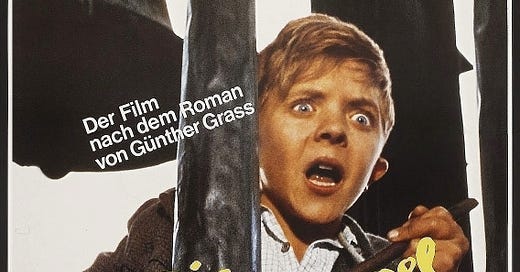At the Cannes Film Festival in 1979 the Palme d’Or - the prize for the top film at the festival - was split and awarded to two films: the German film The Tin Drum, and Francis Ford Coppola’s Apocalypse Now. Both deal with war as a subject and both are adaptations of famous novels seemingly hard to adapt, yet they were executed very well anyways. Although splitting the Palme d’Or is nothing new for the festival1, I thought it would be interesting to pick which film should be considered the true winner for 1979.
To begin, Coppola’s film was somewhat protested, being entered as a work in progress instead of a finished piece, but it still wowed enough to garner the French prize, which speaks to the power of his vision and that film in and of itself. That is a little shocking in itself, especially knowing the insanity this film went through to get finished - notably captured in the documentary Heart of Darkness. Still, Apocalypse Now is often cited as one of the most prolific, influential, and important movies of all time. It has been parodied, mimicked, copied, and so on, but even those who have tried to match it with their own Vietnam stories can never seem to fully get to the level executed in this film. While Apocalypse Now did not bring home any major hardware from the Oscars2, its staying power in not only American cinema, but cinema history as a whole cannot be understated.
The Tin Drum is a different story. Where Coppola’s film keeps the primary themes of its source text but morphs it around the Vietnamese conflict, Volker Schlöndorff stays fairly faithful to the 1959 novel. The story follows a young boy, Oskar, who is the product of a throuple situation of a Kashubian3 mother, her Polish first cousin, and a German lover. At one point, Oskar decides to injure himself to stop growing at the age of three so he can stay a child forever. We then follow his journey over the next 18 years as he witnesses the fall of his hometown of Danzing to German rule through the second world war. It is an oddity to say the least, and one that didn’t come without its own issues4, yet one that is pretty beautifully shot. There’s a reading about one’s refusal and inability to accept the reality of the world around them; about being torn between identities in a world that wants to label you; being forced to take sides in a conflict you don’t want to take apart of; aligning with values against your own just to survive; the farcical nature of war and its propagandistic techniques; and how, at the end of the day, we are all just sexually deprived beasts. In addition to the Palme d’Or, it went on to win the 1980 Best Foreign Film Oscar and was one of the most highly touted German films ever.
So with all of that being said, The Tin Drum is not it for me. I get what it was going for and it seemed, tonally, just way too zany. I’m sure the sexual id of the book was relayed well in the film, but it was such an odd display in addition to all of the other working parts of it, even when, it seems like that same Oedipal nature is supposed to be the most important aspect of the film. It is an important film in its own right, one that is one of the first to truly critique old Germany with this wave of new German cinema, but sitting through two hours and forty four minutes of this was a slog at times5, especially with a wildly unlikable (but very well acted) character. Not to sound like the typical film bro, but I think Apocalypse Now’s importance supersedes this film, and is the true champion of 1979 - even with all of its recuts.
It previously happened six times, the first two years handing out multiple “Grand Prix” awards.
It did win for Best Sound and Best Cinematography.
It is a very sexually charged film that does depict graphic imagery and some simulated imagery with a then 11 year-old which led to censorship and banning for a period.
The initial distributed cut was two hours and 15 minutes, but the director wanted to go back and add some sequences in the 2000s, thus rendering this edition.




